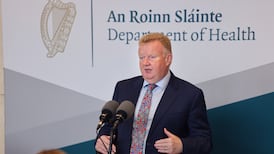The introduction of roadside drug testing may be having the inadvertent effect of tackling the "epidemic" of over-the-counter painkiller abuse in Ireland, according to a leading policy maker.
Medical Bureau of Road Safety director Prof Denis Cusack told attendees at a discussion on drug and alcohol use organised by the Irish College of General Practitioners that the painkiller epidemic is particularly acute among middle-aged women.
“I believe this is actually going to have, inadvertently, a coincidental and an unintended consequence that we might be able to start tackling the over-the-counter overdosing by people using Solpadeine and Paracetamol,” said Prof Cusack of the tests.
Roadside tests for drugs including cannabis, cocaine, heroin and benzodiazepines were introduced in Ireland in April. And commercially available products containing codeine are now also subject to statutory limits.
Prof Cusack added that he has received numerous emails of complaint from individuals who say they have had to come off their prescriptions for over-the-counter painkillers for fear of being caught over the limit while driving.
In an earlier presentation at the conference in St James's Hospital on Saturday emergency medicine consultant Dr Fergal Hickey criticised the "intellectual snobbery" around the issue of cocaine use and questioned the portrayal of the drug in the press and media.
“The only reason that cocaine doesn’t get the bad press that it should get is that it’s deemed to be a middle-class or upper-class drug,” he told the gathering of medical professionals.
“There is a huge amount of intellectual snobbery about drug use that you can see. Cocaine is a very dangerous drug.”
Dr Hickey also noted the dangers of using designer drugs with an MDMA [commonly known as ecstasy, it is a psychoactive drug used primarily as a recreational narcotic] component. He revealed that within the last half-year he has twice had to sedate individuals who presented to Sligo University Hospital with temperatures in excess of 42 degrees after taking a "cocktail" of drugs.
Alcohol addiction
Meanwhile, Royal College of Physicians Ireland president Prof Frank Murray hailed the proposal to introduce minimum unit pricing for alcohol as part of the Government's new Public Health (Alcohol) Bill.
Describing the measures contained in the Bill as “revolutionary”, he said it will help to address the “catastrophic” drinking culture that persists in Ireland, with particular emphasis on the availability of “cheap, pocket-money booze” in supermarkets.
Prof Murray rejected the notion that children under 18 should be introduced to responsible drinking in the home as “wrong” and likened it to child abuse.
He recalled his own astonishment at receiving a consent form asking him to give permission for one of his own children to drink while on a secondary school tour and said schools should be imposing “draconian” rules to prevent similar situations from occurring.
During the same presentation, addiction specialist Dr Hugh Gallagher said drinking during pregnancy remains prevalent and presents a "huge burden" for wider society.
Spectral disorders caused by drinking during pregnancy are often “unrecognised and untreated” despite manifesting in cognitive, behavioural and physical issues for affected children, he added.
Minister of State for Communities and the National Drug Strategy Catherine Byrne noted the "serious problem" of alcohol abuse and said the majority of drinkers in Ireland are problem drinkers.
The Minister again emphasised her commitment to opening a supervised drug injecting facility in Dublin city centre as a pilot project.










